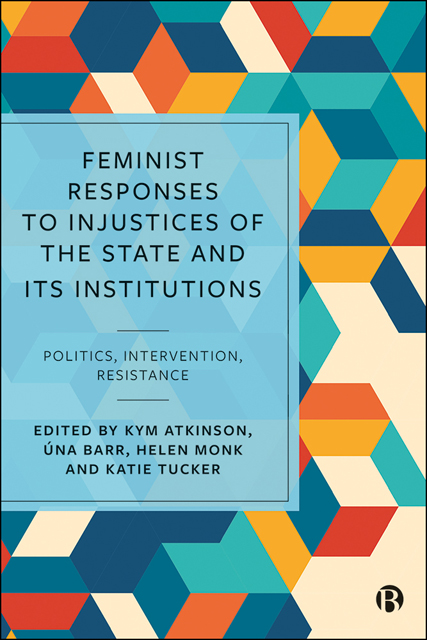 Feminist Responses to Injustices of the State and Its Institutions
Feminist Responses to Injustices of the State and Its Institutions 4 - At the Limits of ‘Acceptable’ Speech: A Feminist Analysis of Official Discourse on Child Sexual Abuse
Published online by Cambridge University Press: 17 June 2023
Summary
Introduction
This chapter draws upon doctoral research into institutional responses to child sexual abuse (CSA) in England between the years of 2010 and 2015. This period was referred to as a ‘watershed’ (BBC, 2015a) for both public awareness and reporting of CSA, both in terms of recent and historical cases (see IICSA, 2021). This heightened awareness was prompted by a number of high-profile cases coming to public attention within a relatively short space of time. These cases include, but are not limited to, large-scale abuse in a number of English towns and regions, including: Blackburn with Darwen, Bristol, Derby, Kent, Newcastle, Oldham, Oxford, Peterborough, Preston and Telford (see Express, 2017). In addition to these cases, abuse perpetrated by high-profile individuals such as Cyril Smith, Gary Glitter and Sir Jimmy Savile, among others, were brought to light, in part, due to the unprecedented Metropolitan Police investigation, codenamed Operation Yewtree.
This chapter focuses on the ways in which CSA was put into official discourse in the period 2010 to 2015. Focusing on the high-profile cases of abuse in the English towns of Rochdale and Rotherham, the chapter considers how the discursive framing of the problem developed in this period. The chapter considers the official responses to the cases in Rotherham and Rochdale through an examination of official discourse. Recognizing the long history of problems set out by feminists, with identifying and dealing with CSA (see, for instance, Rush, 1980; Gordon, 1988; La Fontaine, 1990; Smart, 1999, 2000, 2016), the chapter considers the recent discursive history through these two case studies. Starting from a recognition of the importance of definitions, and aiming to engage with what Ballinger (2016: 9) highlights as the ‘politics of naming’ (see also Chapter 2 in this volume), the analysis considers the discursive construction of the problem – including the perpetrators and victims – and the proposed solutions as contained in official discourse. The aim here is to examine the extent to which the ‘watershed’ period of 2010 to 2015 changed the dominant discourse and whether, after these high-profile cases, feminist interventions were acknowledged or shut down.
- Type
- Chapter
- Information
- Feminist Responses to Injustices of the State and Its InstitutionsPolitics, Intervention, Resistance, pp. 76 - 98Publisher: Bristol University PressPrint publication year: 2022


